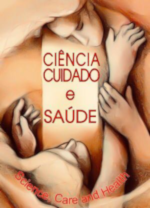Estratégias de ensino na graduação em enfermagem: abordagem das doenças crônicas não transmissíveis
Resumo
Objetivo: identificar as estratégias utilizadas para ensinar doenças crônicas não transmissíveis em um curso de graduação em Enfermagem. Métodos: estudo exploratório e documental, de abordagem qualitativa, desenvolvido no período de janeiro a março de 2016. O cenário foi um curso de graduação em Enfermagem de uma universidade pública na região Sul do Brasil. Participaram da pesquisa 15 estudantes e 11 professores por meio de entrevistas. Os dados documentais foram obtidos no Projeto Pedagógico do Curso e em 11 planos de ensino. A ordenação e organização dos dados seguiram a proposta de análise de conteúdo. Resultados: apontaram duas categorias: Prioridade no uso de metodologias tradicionais e Aproximações com as metodologias ativas de aprendizagem. Existem ações pontuais para a introdução de metodologias ativas em sala de aula, no entanto as metodologias tradicionais ainda são predominantes. As abordagens de ensino-aprendizagem ainda estão centradas no professor, direcionadas por conteúdos, com exposição e domínio dos conhecimentos dos docentes. Considerações finais: as mudanças esperadas nos cursos de graduação em Enfermagem são incipientes no que se refere à utilização de metodologias ativas de ensino.
Downloads
Referências
Souza EFD, Silva AG, Silva AILF. Active methodologies for graduation in nursing: focus on the health care of older adults. Rev. Bras. Enferm. 2018; 71(2): 920-924. Doi: http://dx.doi.org/10.1590/0034-7167-2017-0150
Mattia BJ, Kleba ME, Prado ML. Nursing training and professional practice: an integrative review of literature. Rev. Bras. Enferm. 2018; 71(4): 2039-2049. Doi: http://dx.doi.org/10.1590/0034-7167-2016-0504
Zlatanovic T, Havnes A, Mausethagen S. A Research review of nurse teachers’competencies. Vocat Learn. 2017; 10(2): 201-233. Doi: https://doi.org/10.1007/s12186-016-9169-0
Brito FMM, Rozendo CA, Melo POC. Laboratório de enfermagem e a formação crítica de enfermeiros: aproximações e distanciamentos. Rev. Bras. Enferm. 2018; 71(4): 1500-1506. Doi: http://dx.doi.org/10.1590/0034-7167-2017-0339
Lopes JL, Freitas MAO, Domingues TAM, Ohl RIB, Barros ALBL. Metodologia da problematização: estratégia de ensino para a aprendizagem do procedimento de terapia intravenosa. Cienc. Cuid. Saúde. 2016; 15(1): 187-193. Doi: https://doi.org/10.4025/cienccuidsaude.v15i1.26436
Yin RK. Pesquisa qualitativa do início ao fim. 4. ed. Porto Alegre: Penso, 2016.
Bardin L. Análise de Conteúdo. Lisboa, Portugal; Edições 70, LDA, 2011.
Teixeira E. In times of new national curricular guidelines to the nursing graduation course. Rev Enferm UFSM. 2017; 7(2): 193-205. Doi: http://doi.org/10.5902/2179769226840
Oliveira MA, Abreu JV, Souza EC, Pequeno AMC, Gomes AMA, Machado MFAS, et al. Active methods of teaching-learning in the health area: the problems in nursing education. International Archives of Medicine. 2016; 9(15): 1-7. Doi: http://dx.doi.org/10.3823/1886
Limeira PC, Seiffert OMLB, Ruiz-Moreno L. O que a literatura científica e os projetos político-pedagógicos revelam sobre a qualidade da educação superior em enfermagem? ABCS Health Sci. 2015; 40(3): 276-285. Doi: http://dx.doi.org/10.7322/abcshs.v40i3.808
Mikkonen K, Kyngäs H, Kääriäinen M. Nursing students’ experiences of the empathy of their teachers: a qualitative study. Adv Health Sci Educ Theory Pract. 2015; 20(3): 669-682. Doi: https://doi.org/10.1007/s10459-014-9554-0
Magalhães SMF, Gabrielloni MC, Sanna MC, Barbieri M. Nursing Education: conceptualizing a pedagogical project from the view of professors. Acta Paul Enferm. 2017; 30(3): 247-253. Doi: http://dx.doi.org/10.1590/1982-0194201700038
Guareschi APDF, Kurcgant P. Influence of lecturer training on the profile of the graduate of the undergraduate course in nursing. Cogitare Enferm. 2014; 19(1): 103-110. Doi: http://ojs.c3sl.ufpr.br/ojs/index.php/cogitare/article/view/35965/22419
Freire P. Pedagogia da autonomia: saberes necessários à prática educativa. 53. ed. São Paulo: Paz e Terra. 2011.
Hallin K. Nursing students at a university - A study about learning style preferences. Nurse Educ Today. 2014; 34(1): 1443-1449. Doi: http://dx.doi.org/10.1016/j.nedt
Rodrigues CCFM, Carvalho DPSRP, Salvador PTCO, Medeiros SM, Menezes RMP, Ferreira Júnior MA, et al. Innovative nursing education from the perspective of epistemologies of the South. Esc Anna Nery Rev Enferm. 2016; 20(2): 384-389. Doi: http://dx.doi.org/10.5935/1414-8145.20160053
Lazzari DD, Martini JG, Busana JA. Teaching in higher education in nursing: an integrative literature review. Rev Gaúc Enferm. 2015; 36(3): 93-101. Doi: http://dx.doi.org/10.1590/1983-1447.2015.03.49670
Lima MM, Reibnitz KS, Kloh D, Silva KL, Ferraz F. The pedagogical relationship in practical-reflexive education: characteristic elements of teaching integrality in nurse education. Texto contexto - enferm. 27(2): 1-10. Doi: http://dx.doi.org/10.1590/0104-070720180001810016
Copyright (c) 2020 Ciência, Cuidado e Saúde

This work is licensed under a Creative Commons Attribution-NonCommercial 4.0 International License.




















